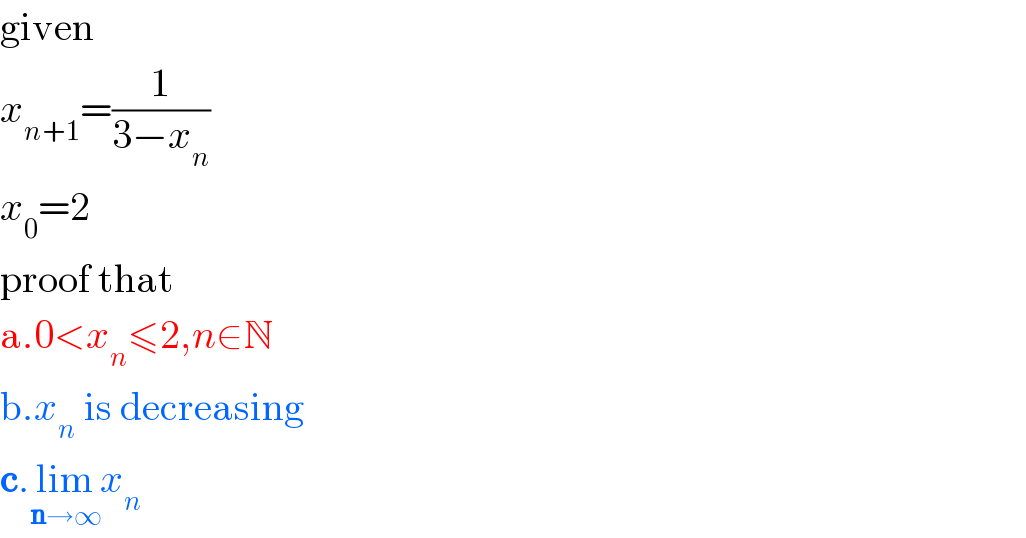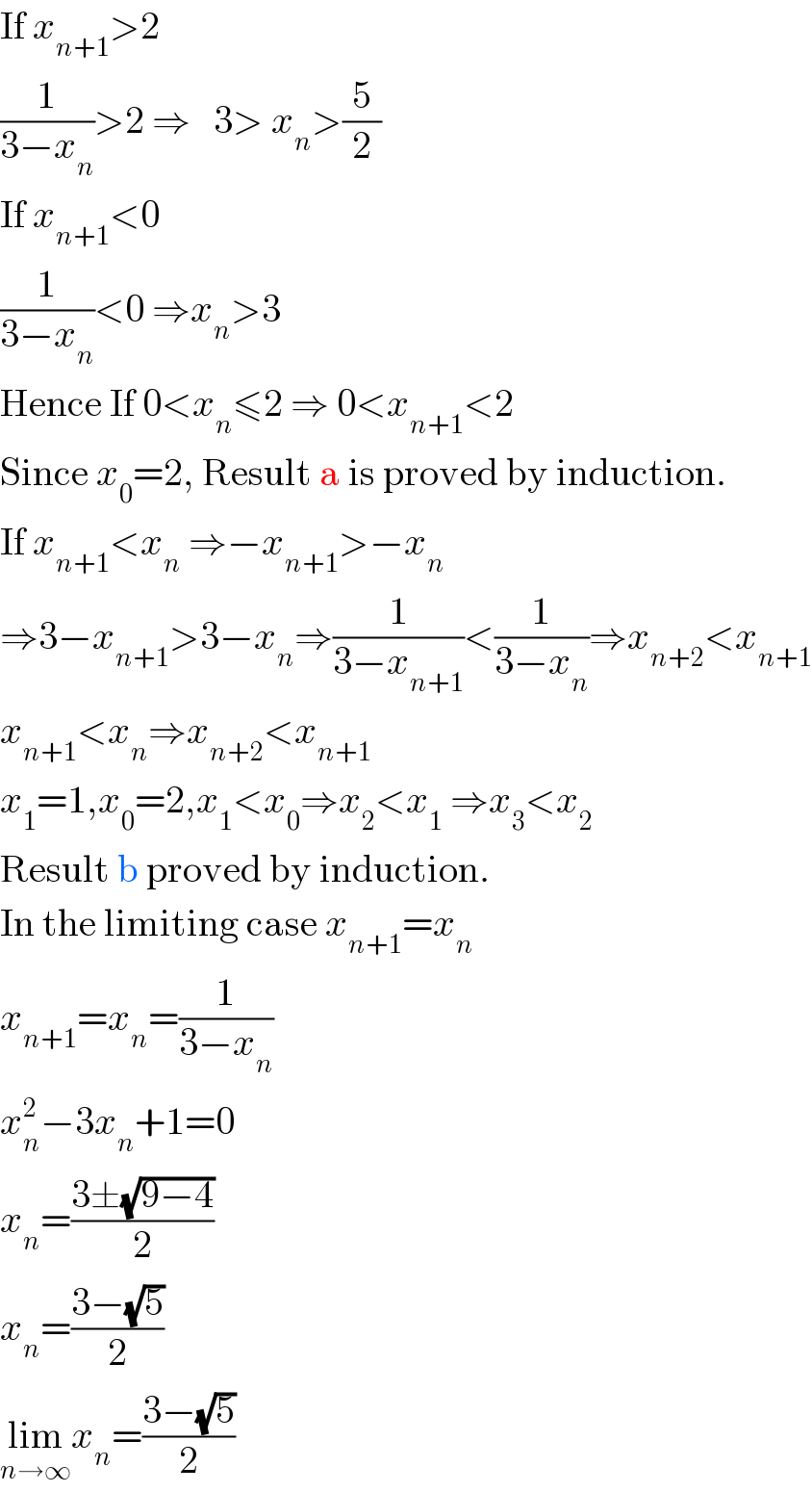Question Number 431 by 123456 last updated on 25/Jan/15

$$\mathrm{given} \\ $$$${x}_{{n}+\mathrm{1}} =\frac{\mathrm{1}}{\mathrm{3}−{x}_{{n}} } \\ $$$${x}_{\mathrm{0}} =\mathrm{2} \\ $$$$\mathrm{proof}\:\mathrm{that} \\ $$$$\mathrm{a}.\mathrm{0}<{x}_{{n}} \leqslant\mathrm{2},{n}\in\mathbb{N} \\ $$$$\mathrm{b}.{x}_{{n}} \:\mathrm{is}\:\mathrm{decreasing} \\ $$$$\boldsymbol{\mathrm{c}}.\underset{\boldsymbol{\mathrm{n}}\rightarrow\infty} {\mathrm{lim}}{x}_{{n}} \\ $$
Answered by prakash jain last updated on 03/Jan/15

$$\mathrm{If}\:{x}_{{n}+\mathrm{1}} >\mathrm{2} \\ $$$$\frac{\mathrm{1}}{\mathrm{3}−{x}_{{n}} }>\mathrm{2}\:\Rightarrow\:\:\:\mathrm{3}>\:{x}_{{n}} >\frac{\mathrm{5}}{\mathrm{2}} \\ $$$$\mathrm{If}\:{x}_{{n}+\mathrm{1}} <\mathrm{0} \\ $$$$\frac{\mathrm{1}}{\mathrm{3}−{x}_{{n}} }<\mathrm{0}\:\Rightarrow{x}_{{n}} >\mathrm{3} \\ $$$$\mathrm{Hence}\:\mathrm{If}\:\mathrm{0}<{x}_{{n}} \leqslant\mathrm{2}\:\Rightarrow\:\mathrm{0}<{x}_{{n}+\mathrm{1}} <\mathrm{2} \\ $$$$\mathrm{Since}\:{x}_{\mathrm{0}} =\mathrm{2},\:\mathrm{Result}\:\mathrm{a}\:\mathrm{is}\:\mathrm{proved}\:\mathrm{by}\:\mathrm{induction}. \\ $$$$\mathrm{If}\:{x}_{{n}+\mathrm{1}} <{x}_{{n}} \:\Rightarrow−{x}_{{n}+\mathrm{1}} >−{x}_{{n}} \\ $$$$\Rightarrow\mathrm{3}−{x}_{{n}+\mathrm{1}} >\mathrm{3}−{x}_{{n}} \Rightarrow\frac{\mathrm{1}}{\mathrm{3}−{x}_{{n}+\mathrm{1}} }<\frac{\mathrm{1}}{\mathrm{3}−{x}_{{n}} }\Rightarrow{x}_{{n}+\mathrm{2}} <{x}_{{n}+\mathrm{1}} \\ $$$${x}_{{n}+\mathrm{1}} <{x}_{{n}} \Rightarrow{x}_{{n}+\mathrm{2}} <{x}_{{n}+\mathrm{1}} \\ $$$${x}_{\mathrm{1}} =\mathrm{1},{x}_{\mathrm{0}} =\mathrm{2},{x}_{\mathrm{1}} <{x}_{\mathrm{0}} \Rightarrow{x}_{\mathrm{2}} <{x}_{\mathrm{1}} \:\Rightarrow{x}_{\mathrm{3}} <{x}_{\mathrm{2}} \\ $$$$\mathrm{Result}\:\mathrm{b}\:\mathrm{proved}\:\mathrm{by}\:\mathrm{induction}. \\ $$$$\mathrm{In}\:\mathrm{the}\:\mathrm{limiting}\:\mathrm{case}\:{x}_{{n}+\mathrm{1}} ={x}_{{n}} \\ $$$${x}_{{n}+\mathrm{1}} ={x}_{{n}} =\frac{\mathrm{1}}{\mathrm{3}−{x}_{{n}} } \\ $$$${x}_{{n}} ^{\mathrm{2}} −\mathrm{3}{x}_{{n}} +\mathrm{1}=\mathrm{0} \\ $$$${x}_{{n}} =\frac{\mathrm{3}\pm\sqrt{\mathrm{9}−\mathrm{4}}}{\mathrm{2}} \\ $$$${x}_{{n}} =\frac{\mathrm{3}−\sqrt{\mathrm{5}}}{\mathrm{2}} \\ $$$$\underset{{n}\rightarrow\infty} {\mathrm{lim}}{x}_{{n}} =\frac{\mathrm{3}−\sqrt{\mathrm{5}}}{\mathrm{2}} \\ $$
